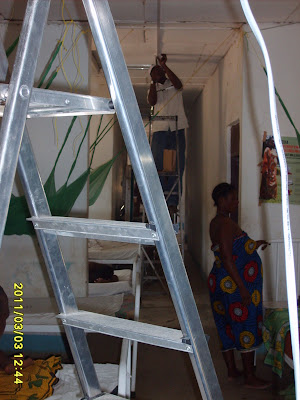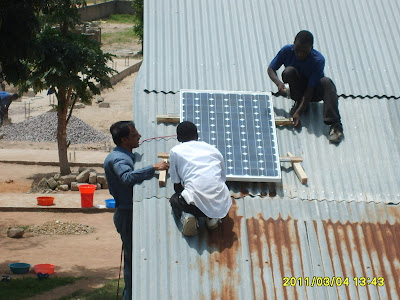Sunday, May 27, 2012
Briquette Making Project.
Hello again,
Thanks to Steve and Patricia for the following blog.
On the island of Ukerewe we saw for ourselves that the traditional method of cooking is a pot balanced on three rocks over a fire and this is still the case in much of rural Africa. Those that can afford to, buy charcoal or sticks for fuel, but the majority have to go out searching and gathering firewood every day.
In the UK alternative fuels are being developed using waste materials such as sawdust, wood shavings, straw etc. On Ukerewe we saw large piles of sawdust and shavings where joinery businesses were operating and Lake Victoria itself is infested with water hyacinth.
Research led us to the Legacy Foundation who have developed a lo-tech briquette making press and have produced a set of manuals on how to build, operate the press, and train a team to make and market the briquettes.
A talented friend constructed a press for us and we have spent many hours making trial mixes and monitoring their burning properties. Any waste material can be used, sawdust, shavings, corn husk, rice straw, leaves, banana skins, anything in fact provided it will burn. The press is now on its way to Ukerewe in the container with all the accessories needed to get the project underway.
Following advice we have made contact with two Tanzanian women trainers who will come to Ukerewe when we are there in July and train a group of Swahili speaking locals; as well as showing them how to produce the briquettes, they will advise on costing and marketing etc. The intention is that the group will produce an inexpensive form of fuel from waste materials to use themselves and sell the excess to produce an income.
We look forward to seeing the Briquette Maker in use on Ukerewe and are sure this will be a sustainable project to help the local people.
Thanks once again to Steve and Patricia for this very informative contribution.
Until next time.
Best Wishes,
Derek and Diane.
Tuesday, May 15, 2012
A Volunteer's Experience in Ukerewe.
Hello,
Nansio Hospital, Solar Lighting.
My name is Sandy Tod and I have been privileged to take part in both the first (October 2009) and second (February 2011) Rotary volunteer trips to Ukerewe. During the first visit when we refurbished Nansio Hospital's operating theatre, it was apparent that while the hospital is connected to mains electric power, it is notoriously unreliable and the hospital suffered frequent and sometimes extensive power cuts. It is not difficult to imagine the havoc this can cause in the operating theatre and the delivery room in the maternity ward. This part of Tanzania, being two degrees south of the equator enjoys year round sunshine about two hundred and fifty hours a month, every month of the year, so it seemed crazy not to take advantage of the sun's energy to provide reliable electric power for these vital hospital areas. A back-up solar lighting system was therefore proposed to be implemented on the second visit.
Being the proposer, I was given charge of the project, not an easy assignment as I am no electrician, but a civil engineer! Attendance at a three day course at the Centre for Alternative Technology (CAT) at Machynlleth in Wales gave me a good grounding in the basics of design and installation of an off-grid solar system. A Mwanza Rotarian, Rajan, who owned a solar systems company in Mwanza provided the equipment at cost and his own services as installer, free of charge.
On site local assistance was provided by Rashidally, the electrical instructor at the local vocational college and two of his students, who installed new wiring to supply the back-up lights. A godsend was Dennis, a retired electrician from Harlow Tighe, Essex who came out as a volunteer and kept us from electrocuting ourselves!
Back-up lighting was provided by low energy LED tube-lights duplicating the existing fluorescent system. The inclusion of the Maternity Ward involved a 15m long overhead line to connect it to the operating theatre. The length of the circuit meant that to avoid excessive energy loss, the 24v DC system had to be transformed up to 230v AC.
Work started with Rashidally and his team installing the new trunking and wiring.
The small overcrowded and constantly busy maternity ward presented a particular challenge. Some of the wiring had to be taken above the ceiling involving a precarious crawl through the loft space on old lightweight timber rafters in stifling heat, with nesting bats as company!
Specialist equipment arrived on programme via the daily vehicle ferry from Mwanza. The picture shows one of two 12v 150 Ampere-hour batteries being unloaded at Nansio.
Rajan sets up the inverter in the battery room, a small disused room in a corner of the theatre building. The inverter converts the 24v DC electric current from the batteries into 230v AC current to power the system.
Finally, with the battery room equipment installed, the wiring complete and LED tube-lights fitted, the first of two solar panels is fixed to the roof of the operating theatre.
Rajan in the battery room checking that everything is working as it should. The back-up system is automatically triggered by a mains power failure, so it can be tested by simply cutting off the mains supply.
Happily everything works satisfactorily. The picture shows emergency lights on in the Maternity Ward, - a happy Ward Sister! We finished one day ahead of schedule and during the first night with the system working, an emergency operation was completed thanks to the back-up lighting system.
Our thanks go to Sandy for this very interesting article.
Until next time,
Best Wishes,
Derek and Diane.
Tuesday, May 8, 2012
Urinals for Ukerewe.
Hello again,
One of Hull's long established family business's Snowden & Co Ltd founded in 1898 have generously come to the help of Rotary and their ongoing humanitarian project on Ukerewe Island, situated in Lake Victoria, Tanzania.
Although specializing in welding and fabrication including large pressure vessels for industry, after hearing and seeing the almost complete lack of toilet facilities in the Senior Schools on the island, they have manufactured two stainless steel urinals which are already on their way in the forty foot container, which will arrive on the island by the time the working group of volunteers get there in July.
The photo shows Patricia Rowe from the Rotary Club of Helmsley and District, who used to live and work in the Hull area, James Brown, age 20, who was given the task of designing and making the urinals, and Glyn Barrick, Managing Director of Edwin Snowden at the back.
James is coming to the end of his apprenticeship with the company and this work will be submitted as part of his qualification.
Sincere thanks go to the company, including the former M.D. and now Chairman Liz Young for this wonderful donation.
One of the projects in July is to build a new toilet block at one of the schools, and these urinals will make a big improvement to the facilities for the children.
Until the next time,
Best wishes,
Derek and Diane
Subscribe to:
Comments (Atom)











